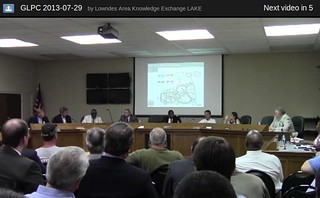 County Planner Jason Davenport said the proposed
Moody Family Housing was “in the Nelson Hill neighborhood”,
and there were at least 30 pages of updates, but the
County Clerk wouldn’t show them to LAKE without an Open Records
Request, which hadn’t yet been satisfied at the end of the day.
Commissioners had some questions about acreage and traffic,
some of which were answered by the ubiquitous Attorney Bill Holland,
and others of which were not answered very well by County Engineer
Mike Fletcher, at
this morning’s Work Session of the Lowndes County Commission.
County Planner Jason Davenport said the proposed
Moody Family Housing was “in the Nelson Hill neighborhood”,
and there were at least 30 pages of updates, but the
County Clerk wouldn’t show them to LAKE without an Open Records
Request, which hadn’t yet been satisfied at the end of the day.
Commissioners had some questions about acreage and traffic,
some of which were answered by the ubiquitous Attorney Bill Holland,
and others of which were not answered very well by County Engineer
Mike Fletcher, at
this morning’s Work Session of the Lowndes County Commission.
6.b. REZ-2013-09 Moody Housing, Val Del Rd R-1 to Residential PD, LC Water & Sewer, ~64 acres
Davenport said:
As of last Friday we did receive an updated site plan as well as some elevations from the applicants to let us know exactly what the houses would look like, what they’re anticipating. The site plan did have four changes and I’ll hand these out to you in just one minute. We added some notes about the uses. We wanted to make them show us where their proposed signage was and we wanted to make them clarify who would be maintaining the open space and the green space….
He passed those updates out, but the County Clerk refused to supply copies for LAKE without an Open Records Request. Gretchen filed an ORR, but if the county takes the statutory three days, we won’t get copies, nor will you, before the Commission votes tomorrow evening..
Here’s Part 1 of 2: Continue reading













